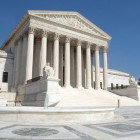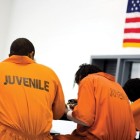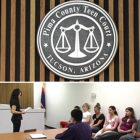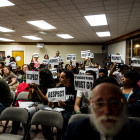
Vera Institute of Justice: Community Corrections Can Answer Mass Incarceration Problems
|
Community supervision aimed at high-risk offenders, as well as mandatory evidence-based programs, have the potential to curtail the U.S. correctional system.
Juvenile Justice Information Exchange (https://jjie.org/tag/featured/page/4/)

Community supervision aimed at high-risk offenders, as well as mandatory evidence-based programs, have the potential to curtail the U.S. correctional system.

Pennsylvania’s Supreme Court ruled last month that young people may no longer be held in adult prisons while awaiting juvenile court hearings. The high court ruling redefines “detention facilities” to expressly exclude state- or county-level jails or prisons, while similarly altering the state’s definition of “juvenile” to include youths who have been placed in detention for probation violations. Under Pennsylvania law, all minors ages 10 to 17 must have their cases heard in juvenile court. In some instances, youth as old as 21 may remain under the jurisdiction of the juvenile court. “Every once in a while a judge would find someone who is under juvenile court jurisdiction, but over age 18, and want to teach them a lesson and put them in county jail,” Robert Schwartz of Philadelphia’s Juvenile Law Center told The Scranton Times-Tribune.

The nation loves an entrepreneur, or at least a good story about one. There is something about the “pull yourself up by your bootstraps” mentality, the lure of taking big risks for big rewards, and the dream of working for ourselves that is attractive, especially in a world where most of us find ourselves working for someone else in a less than ideal setting, and doing work that isn’t particularly rewarding either financially or personally. One subset of the entrepreneurial storyline involves crime, especially drug dealing. This is even more appealing to those who lack the connections, education, money and other kinds of support that make more mainstream ventures possible. For kids growing up in a lot of neighborhoods in this country the drug dealer may be the only example of someone working their way to a better life they see.

Last year, the Supreme Court declared mandatory life without parole sentences for juveniles to be unconstitutional. A year after the landmark ruling, how have the nation’s juvenile justice systems been impacted?

The United States Bureau of Justice Statistics (BJS) has released a new report detailing rates of sexual victimization in the nation’s juvenile facilities.
The report, incorporating data from the 2012 National Survey of Youth in Custody, found that nearly one in 10 young people in state-operated or state-contracted juvenile facilities reported at least one sexual victimization incident last year.

An OJJDP-sponsored webinar last week discussed the merits of youth courts as an alternative school disciplinary approach.

Much of today’s jail and prison population is young people arrested on drug offenses, many so heavily into narcotics that they are considered mentally ill.

NEW YORK -- Daphne Culler whispered the words from the courtroom visitor’s bench, so quietly practically no one could hear.
“Just relax,” she said.
Culler, her face impassive, never broke eye contact with her daughter, who sat across the room at the witness table.
The 15-year-old, who was accused of assaulting a shop owner, mumbled each answer. Twice the judge told her to speak up. Her demeanor alternated between anxiety and annoyance at the repeated questions, a quick smile sometimes flashing across her face until the next question called her to attention.

Next Tuesday’s election for seats to the East Ramapo Central School District’s board isn’t about politics in the traditional sense, it’s about the divisions between the black and Latino residents who see the public school system as a civic stepladder to a better life, and the Hasidim, a mystical religious sect, that sees it as a threat to its way of life.

On Tuesday, Illinois state senators passed two bills with potentially profound implications on the state’s juvenile justice system. By a 40-10 vote, the Illinois Senate passed House Bill 2404, which would place young people in the state charged with felonies under the jurisdiction of juvenile courts as opposed to the adult system. Currently, 17-year-olds in Illinois charged with felonies are automatically tried as adults. If the bill is signed into law, such youth would instead be tried, initially, in juvenile courts, where judges have greater ability to avoid handing out sentences that entail incarceration. Under the legislation, however, 17-year-olds with serious offenses are still eligible for transfer to adult courts.